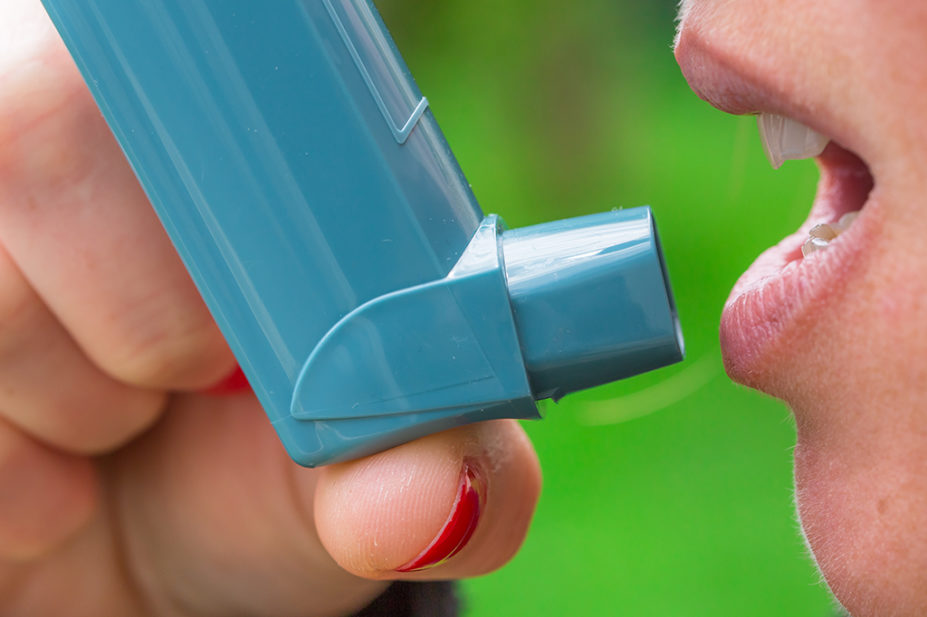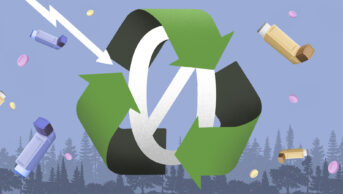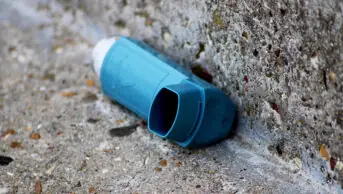
Shutterstock.com
A 12-month pilot postal recycling scheme involving community pharmacies has seen the return of more than 20,000 asthma inhalers across Leicester, Leicestershire and Rutland, according to figures published in npj Primary Care Respiratory Medicine.
The ‘Take Action for Inhaler Recycling’ (Take AIR) scheme has saved the equivalent of an estimated 119.3 tonnes of carbon dioxide emissions from entering the atmosphere.
The authors of the paper, published on 21 January 2023, said the results demonstrated the “feasibility and effectiveness” of a postal inhaler recovery and recycling scheme, which could be used as a foundation to build future initiatives.
Take AIR was set up and funded by pharmaceutical company Chiesi, with the aim of disposing and recycling empty and unwanted inhalers of any brand or type, with users sending them to a waste management company via post.
Community pharmacies and hospitals in Leicestershire were invited to participate at the beginning of the scheme in February 2021. In total, 148 sites enrolled between February 2021 and February 2022, the majority within the first month.
Participating pharmacists discussed Take AIR with patients and provided them with pre-paid, pre-addressed envelopes. Patients could then fill the envelopes with up to four inhalers per envelope and post them to a waste management company via a Royal Mail tracked service.
All inhalers were accepted in the scheme. Pressurised metered-dose inhalers, which made up 77% of all inhalers returned, were dismantled and the component parts recycled where possible. The remaining propellant gas was then extracted for reuse in refrigeration and air conditioning industries. Other inhaler types were incinerated in an ‘energy-from-waste’ facility.
Over the course of the 12-month scheme, 20,049 inhalers were returned by patients; an average weekly return rate of 386 inhalers or 2% of all inhalers prescribed in the region. The number of inhalers returned by patients increased over time with 451 returned in the first month, compared to 2,906 in the last full month.
Anna Murphy, consultant respiratory pharmacist at University Hospitals of Leicester NHS Trust and lead author of the study, said that, following the pilot, the programme had been extended for another year and was due to end in March 2023, adding that was in negotiations with the [Leicester, Leicestershire and Rutland] integrated care board (ICB) to see how it could be extended further.
“What the Take AIR scheme showed was excellent collaboration across an ICB; it involved hospital, community hospitals and community pharmacists, [and] no one was being paid for this extra work. It showed that the healthcare professionals involved were keen to do the right thing for the environment and to support patients at the same time,” she said.
“It also showed that there was a thirst from patients to be involved and to recycle their inhalers.”
In August 2021, NHS England said that it had no plans to introduce a national inhaler recycling scheme, but Murphy said that she was currently involved in conversations with NHS England over a national programme.
“This has to be a national programme,” Murphy said. “We’ve got to stop patients putting inhalers in the waste, which is absolutely awful for the environment. We need those inhalers returned to pharmacy, and if they’re being returned to pharmacy, we should be responsibly recycling them.
“[However] the recycling is really the end, what we want to do is get much better green prescribing, right at the start, by getting the diagnosis right, before we even prescribe an inhaler.
“So, thinking about dry powders much more, thinking about using combination inhalers to cut out the amount of salbutamol overuse we have, increasing adherence to ICS; all that good practice will have a massive impact on the amount of inhalers that we use nationally.”
NHS England would not comment on any developments towards a national scheme.


